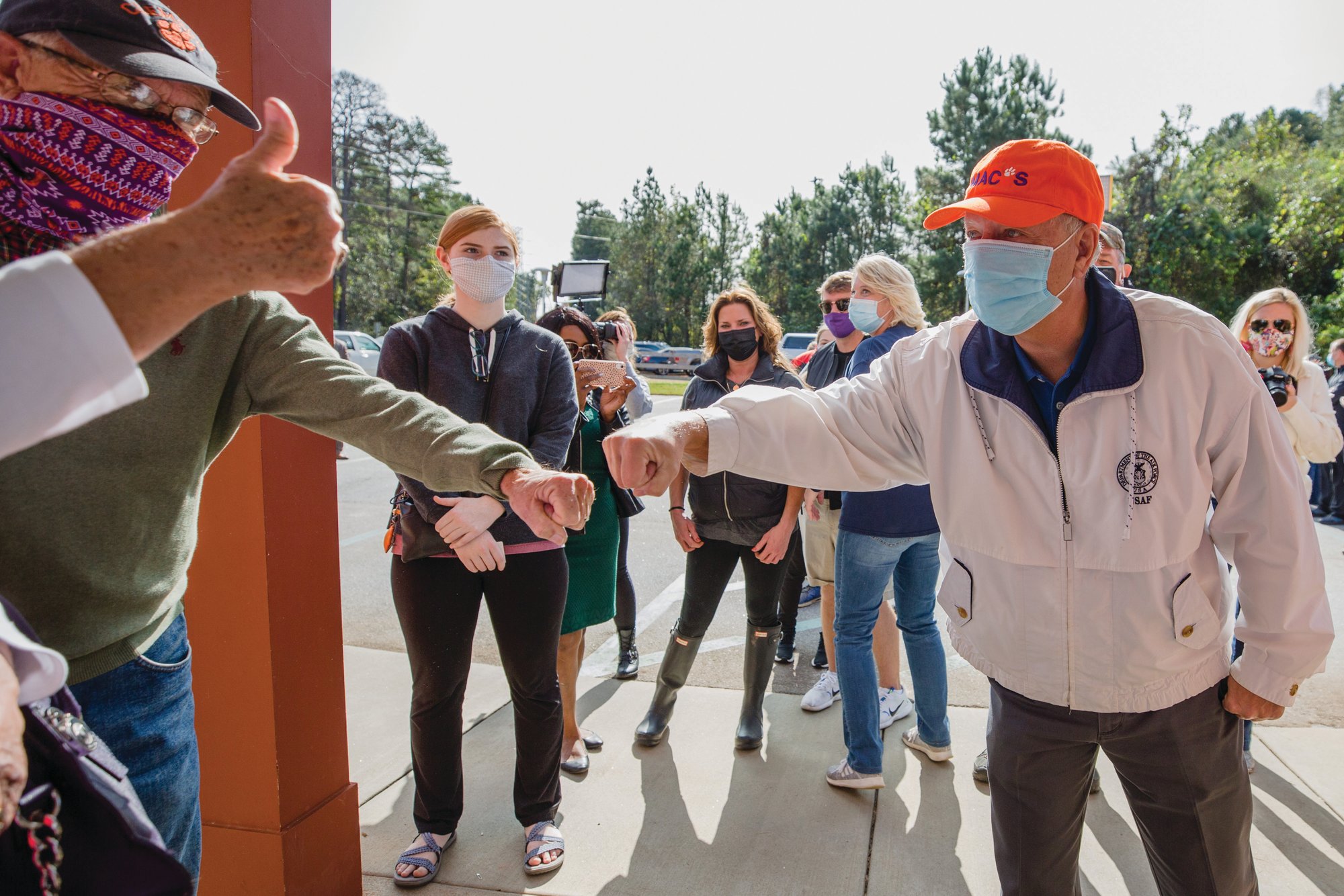Despite massive Democratic fundraise, Graham easily wins
By MEG KINNARD
The Associated Press
CHARLESTON - Despite repeatedly breaking fundraising records throughout his campaign to unseat U.S. Sen. Lindsey Graham of South Carolina, raising more than any U.S. Senate candidate in history and more than many presidential campaigns, Democratic challenger Jaime Harrison couldn't oust the veteran Republican, who won by a double-digit margin on Tuesday.
For months, the amount of money raised and spent topped headlines, as Harrison - an associate Democratic National Committee chairman and former lobbyist who also once led South Carolina's Democratic Party - repeatedly broke records, both for fundraising in a single quarter and overall, in a year where several Senate races across the country reached into the hundreds of millions.
In his candidacy's nascence, Harrison told The Associated Press he imagined it might take $10 million to oust Graham. In the end, the Democrat raised more than 10 times that, becoming the first U.S. Senate candidate ever to cross the $100 million threshold. In all, Harrison brought in a total of $130 million, according to his campaign.
Harrison's fundraising was so astounding many asked how he could possibly spend all the money in a state with relatively cheap TV time. But after a record $57 million third quarter, Harrison told AP that all that money had indeed been spent, with tens of millions on advertising, plus more on grassroots.
Some of Harrison's copious cash also went toward an effort to drive conservative voters toward a Constitution Party candidate, who - even though he had dropped out to endorse Graham - still remained on ballots. Graham and other Republicans condemned the effort, and the candidate, veterinarian Bill Bledsoe, demanded Harrison take down the "dirty tricks" ads.
It was unclear how much Bledsoe's margin could effect either candidate, but even after an aggressive print and ad campaign by Harrison and supportive outside groups, the strategy seemingly fell flat. In the end, Bledsoe earned just a little more than 1 percentage point of the vote.
As outside groups became involved, even more money poured into the state that, combined with the candidates' coffers, resulted in wall-to-wall television and digital advertising Graham frequently referenced on the trail. The money became a refrain among Republicans decrying what they described as an exorbitant influx from out-of-state Democrats trying to effectively buy the seat.
But Graham, who Tuesday said the whole race "has been overwhelming," was able to muster his own fundraising to compete. During a bus tour on the campaign's closing weekend, he told AP that other Republican campaigns had already been calling him for fundraising advice. During frequent television appearances, many around the confirmation of Supreme Court Justice Amy Coney Barrett - which he oversaw as Senate Judiciary Committee chairman - he included fundraising plugs.
"The story of this election is going to be, I think, if I win, the ability to adapt," Graham told AP last weekend. "I was being outraised 3-to-1, but we adjusted. We've created a fundraising apparatus that I think will be the template for Republicans in the future."
Out-of-state spending on both sides was high. According to federal election data, about 93% of Harrison's contributions came from outside South Carolina, compared with 87% of Graham's.
In his victory speech, Graham referenced his nationwide support, an effort he has said was necessary to be able to vie with Harrison's astronomic numbers.
"There are people all over this country who came to my aid. There are people who had never given 15 cents, who gave me what they could," Graham said. "Ted Cruz's mother sent me 30 bucks."
Even with the staggering fundraising, Graham's comfortable victory margin Tuesday nearly matched his 2014 win over Democrat Brad Hutto, a state senator who raised about $500,000 - some of which he loaned himself.
Though polls had shown a close race, local observers urged caution, citing the state's history of electing statewide Republicans by wide margins. When the votes were counted, Graham won by 11 percentage points.
On Wednesday, Harrison's campaign cited frustrations with that polling data.
As results came in Tuesday, Republicans at Graham's victory celebration projected confidence. No matter how much money had been spent, Lt. Gov. Pam Evette told supporters, Graham's win would be a signal of force to Democrats seeking success in the conservative state that, also sent its first Republican woman to Congress on Tuesday.
"We're going to send a clear message to California and to New York that seats here in South Carolina are not for sale," Evette said. "You can take your $140 million and go home packing because Sen. Lindsey Graham will be going back up to D.C."
Analyzing the spending Wednesday, state GOP Chairman Drew McKissick told AP that, given Graham's decisive win, coupled with a red wave that swept through races across the state, he imagined out-of-state Democrats would feel hard-pressed to hone in on South Carolina, anytime soon.
"I don't think they're going to be able to find people stupid enough to invest $120 million and try it again," McKissick said. "That's a lot of money to flush down the toilet and get beat by 10, 12 points. ... If they want to come, invest more money in South Carolina and try the barbecue and then leave? Fine."
To Harrison's funders, Graham spoke directly Tuesday.
"You wasted a lot of money," he said. "This is the worst return on investment in the history of American politics."
More Articles to Read

